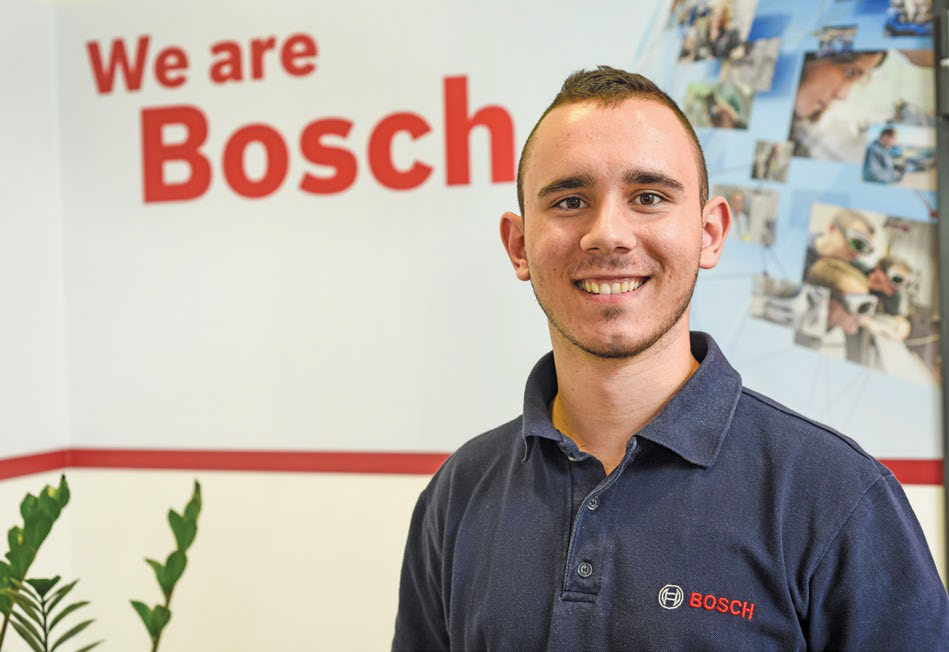Miloš Tatić is one of the ten young men, students of the “Milenko Verkić Neša” Technical School in Pećinci, who graduated as industrial mechanics in June 2016. July of the same year already saw all of them employed at the nearby factory of the “Robert Bosch” company in Šimanovci, where they attended work-based learning for two years. They are the first generation of students in the new educational profile of industrial mechanic, trained in accordance with a model unique in the educational system of Serbia. It involves three months of work-based learning at a company during the second year, and two three-month turns during the third year of school.
Miloš believes this model to be the most efficient, because he and his friends acquired enough theoretical knowledge that they could then apply in realistic working conditions at the company. Although their education made them competitive in the labour market, none of them will be sending their resumes to other companies, because they are happy with the working conditions at “Bosch”.
Responding to the question if adaptation to work was easier for him because his entire class was employed at the same company, Tatić says that he does not see his classmates too often, because they all work in different posts. He works in quality control of products manufactured at this factory. “I am in the laboratory, supervising the operation of the machines that test the quality of the wipers that leave the production line. Simply put, I monitor the results displayed by the machines and make sure they are in accordance with our standards. If there are any problems, which rarely happens, my job is to stop the production line and call in experts to diagnose and remedy the issue”, Miloš briefly explains his job. There is a widespread belief that graduates of three-year schools are faced with
hard manual labour. However, Miloš says this does not need to be so: “My job is not physically demanding at all in that sense, but it has a high degree of responsibility and requires a lot of concentration at work.”
When they started working at “Bosch”, the former students were already quite familiar with the work processes, conditions and environment. In this regard, employment was not a big change for them. Still, as Miloš says, there is one key difference between having an employment contract compared to the period when you are on work-based learning: “It is responsibility. Nothing else has changed. We are already accustomed to the working conditions at ‘Bosch‘, our colleagues are still nice to us and always willing to help, but now we are employed, and we place our signatures on each report on machine operation, which is a completely new experience for us. This means that we stand by our work with our full names”, says Miloš Tatić and adds that he does not find his new responsibilities difficult, because he is certain of the knowledge he gained during education.
Spomenka Rakić, headmistress of the “Milenko Verkić Neša” Technical School, is proud of the first generation of industrial mechanics, saying they did well during work-based learning at “Bosch”, where they were regular, diligent, and highly engaged. They constantly came up with new ideas for improving the manufacturing process, and some of their ideas have been accepted by older colleagues and supervisors. Interest in this occupation has grown within the municipality since the introduction of the profile of industrial mechanic at the technical school in Pećinci – an increasing number of children now want to enrol in this profile, but also an increasing number of companies want to take active part in their education. The headmistress notes that girls are also becoming more interested in this profile, which was not the case thus far with three-year technical profiles in mechanical engineering.
Three-year profiles offer good perspectives
In addition to having instructors at each production post to train the students, “Bosch” hired Marko Radović as supervisor for dual education. Radović completed pedagogical-didactic training for working with young people and is responsible for implementing work-based learning at the “Bosch” manufacturing plants. He appoints students to certain learning posts, makes sure they master all teaching units
envisaged by the curriculum and is in constant communication with the teachers at the school. Radović says that each generation is unsure when first coming to the company: “They come in a group, they are confused, don’t even know what question to ask us, but once the initial surprise wears off, they relax and become part of the staff.. In time they grow into equal colleagues with our employees, because practical training provides them not only with professional know-how, but the ability to work in a team and master business communication skills.” Young people, their supervisor says, are more open and have fewer prejudices than adults, making it easier to acquire new knowledge. “Very quickly, almost without noticing, after a mere two years of coming here, we realize that they have become adults. Once they graduate and become employed, they are already responsible, serious and mature people”, concludes Radović.
Example of Miloš Tatić also confirms this. He wants to continue working at the “Bosch” company, but is also thinking about enrolling at a college or the Faculty of Mechanical Engineering. He believes he can study while retaining his job, but even if he does not manage this plan, he will be satisfied because, as he says without any false modesty, he has already achieved a lot. He noticed that he is more responsible and has better working habits than his peers who did not have an opportunity to be introduced to the world of work during education.


